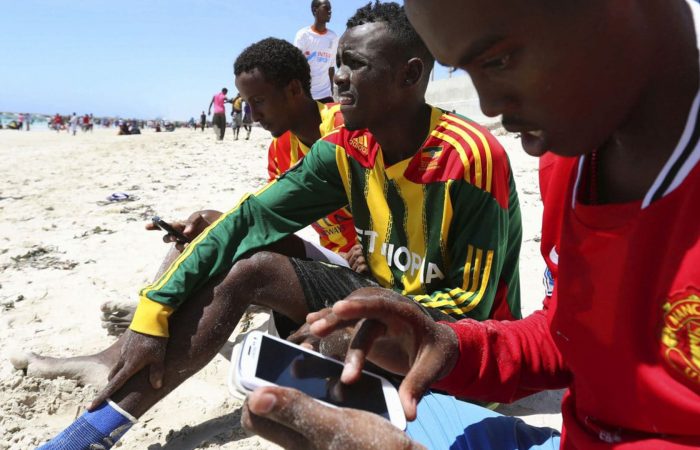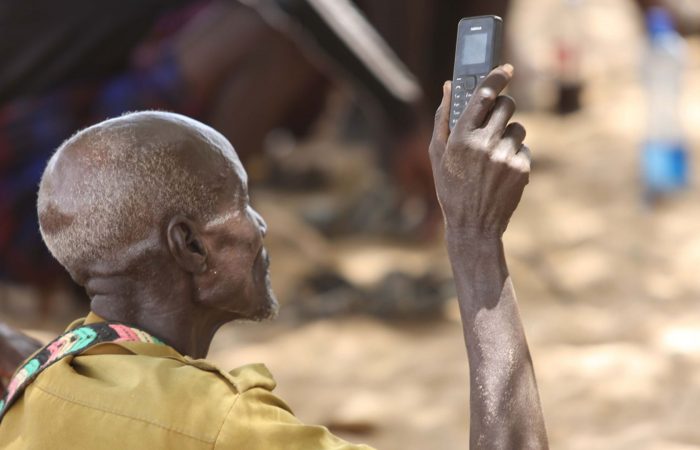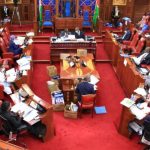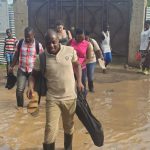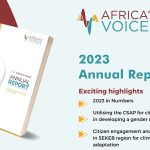From setting “agenda at the community level,” to how AVF has grown from an idea
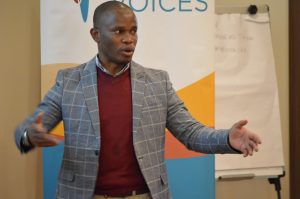
Photo: Moses Maina, Project Manager, Africa’s Voices Foundation.
Moses Maina is a Project Manager at Africa’s Voices Foundation under the Citizen Evidence for Social Change programme (CESC). The CESC programme leverages Africa’s Voices’ interactive radio and mixed-methods capabilities to put citizens at the heart of programme design and policy response. In addition, the citizen voice-centred approach enables us to unravel social norms that underpin harmful practices, determining key drivers of social and behaviour change and tracking the shift in beliefs over time. In the media-enabled discursive spaces we curate, negative views can be contested by the public itself and positive attitudes for social change can be made visible.
Moses has been key in leading multiple Africa’s Voices projects that seek to change communities’ behaviour, beliefs and attitudes. He was at the center of implementing “Media and citizen evidence driven social and behavior change project,” for the WUSC’s Kenya Equity in Education Project (KEEP). The project deployed AVF’s radio and SMS methodology to determine and address the factors that hinder girls’ education in Dadaab and Kakuma refugee camps in Kenya. We sat down with him, and here he tells us about his journey at Africa’s Voices – from how his role at AVF helps set “agenda at the community level,” to how AVF has grown from an idea at the University of Cambridge, to a fully fledged organisation working in Kenya and Somalia.
- What does your typical day look like at Africa’s Voices Foundation?
On a day to day basis I carry out project management and coordination tasks to ensure effective implementation of projects assigned to me. During broadcasts, I support media and engagement by training radio journalists, developing radio show scripts and overseeing the broadcast of our shows. To implement a successful project, there is another essential factor, communication, which cannot be overlooked for a successful implementation of any project. Under the leadership of the Senior Programme Manager, I ensure there is seamless communication of the partners’ expectations to the project staff so that the result will be as expected. I also liaise with the AVF’s communications team to communicate and disseminate projects successes and results.
2. Tell us about how your role creates an impact on the community?
Effective implementation of the planned activities helps in achieving project objectives and outcomes that impacts the AVF’s target beneficiaries and communities. I participate in the design of social behavior change radio content which is broadcasted on various partner radio stations, and this helps in challenging existing norms, attitudes and perceptions while instilling the right behavior to the audience and community at large. To put this into perspective, our work in Dadaab and Kakuma refugee camps on addressing the norms that hinder girls’ education brought about significant change in behaviour. I was deeply touched by an SMS we received from a parent who reported to have abandoned their initial plan of marrying off their daughter after listening to our radio shows through radio Ata Nayeche and Bibilia Husema (Kakuma) and Star & Gargaar (Dadaab). This is an indication that our work to change behaviours and attitudes towards girls’ education in the refugee camps was not in vain.
Finally, I work a lot with radio presenters training them on running effective interactive radio shows. Many of these community radio presenters are untrained journalists who just volunteer to work as journalists. The training has built their capacity and now are able to constructively run interactive radio shows convening spaces for community debates to happen which sets the agenda at the community level.
3. What made you choose Africa’s Voices Foundation?
Several things made me choose AVF, but most importantly, AVF’s deliberate intention to create plural and inclusive conversations with an aim of listening to everyone despite their gender, age, nationality, religion etc stood out. The whole unique methodology of bringing together citizens and their leaders, by listening to them through radio and allowing them to send feedback through free SMS, hence being able to place the people’s views and opinions at the centre of development, decision and policy making processes, is intriguing. Many organizations hardly take time to listen to their beneficiaries, especially to those seen as powerless and voiceless. The desire to be part of the solution of bridging the gap between citizens and decision makers through technology was and is irresistible in me.
4. Since joining, does your initial impression of AVF being an organization that places citizens’ voices at the center of development still hold?
Good things take time and patience is vital. It has taken AVF time to get where it is, overcoming many barriers along the way but through all these I still believe in the AVF dream which is becoming even more clearer each and every other day. Unlike before, the world today appreciates more the role of citizen engagement in all development, decision and policy making processes and this means that the AVF dream of placing citizen voices at the centre of development has become more practical.
5. What has your experience at AVF been like so far?
It has been great, with many lessons. Working at AVF has enabled me to appreciate involving and listening to everyone despite their race, gender, age, status etc. I have worked on various projects in Kenya, Dadaab and Kakuma refugee camps in particular, an experience that has honed my skills to work in a diverse and multicultural environment. As mentioned before, from October 2019 – May 2021, I steered the implementation of the Kenya Equity in Education Project (KEEP) project dubbed Media and citizen evidence driven social and behavior change for KEEP II. The project aimed at driving social and behavioural change through interactive radio and existing interpersonal spaces on advancing girls’ education outcomes and gender equality. In a nutshell, we were able to conduct more than 116 radio shows and held over 228 listening group discussions. We received 37,015 messages from 8,702 participants who engaged with the programme via free SMS. Working at AVF has given me a chance to learn and grow my personal skills and I feel I am a better person today.
6. Being one of the pioneer staff members, what was the hardest part of setting up AVF in Kenya?
In my view, moving from 2017- 2019 was tight for AVF, first we really struggled financially and many staff members left as the organization was financially threatened, causing some instability in the human capital. Then after that period the finances took shape and AVF now carried out recruitment for a business operations team to start putting structures in place. Right now AVF is well resourced to undertake significantly impactful work in Kenya, Somalia and beyond.
7. How would you describe the transformation AVF has gone through over the years?
I would say, AVF was tested from an idea at the University of Cambridge Computer Lab in the United Kingdom, into a project and later an organization and this has taken time. AVF operated from zero systems and structures and has now grown into a fully fledged organization with clear structures and systems and this is a big achievement in my view. It has been a tough process but today I can see the fruits of this process.
8. How would you wish the organisation to be shaped in the next five years?
Now that AVF has managed to set up proper structures and adequately tested its method, I think it’s time to get out there and look for bigger projects that will have greater impact. This will be attained by seeking for partnerships with Counties and the National Government in Kenya and beyond, international organizations, learning institutions etc.
